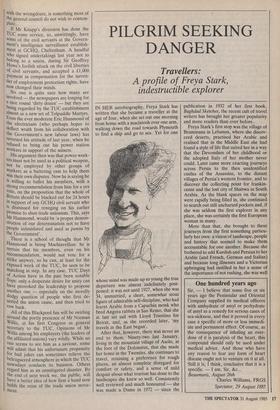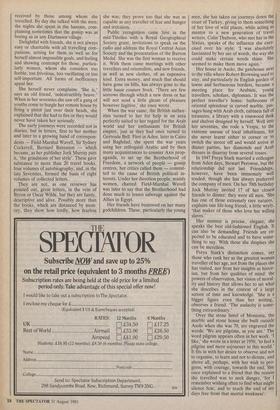PILGRIM SEEKING DANGER
Travellers: A profile of Freya Stark, indestructible explorer
IN HER autobiography, Freya Stark has written that she became a traveller at the age of four, when she set out one morning from home with a macintosh over one arm, walking down the road towards Plymouth to find a ship and go to sea. Yet for one whose mind was made up so young the true departure was almost indefinitely post- poned: it was not until 1927, when she was 34, unmarried, a short, somewhat stout figure of admirable self-discipline, who had learnt Arabic from a Capuchin monk who bred Angora rabbits in San Remo, that she at last set sail with Lloyd Triestino for Beirut, and, as she recorded later, `my travels in the East began'. After that, however, there was never an end to them. Ninety-two last January, living in the mountain village of Asolo, at the foot of the Dolomites, that she made her home in the Twenties, she continues to travel, retaining a preference for rough places, an almost complete disregard for comfort or safety, and a sense of mild despair about what tourism has done to the landscapes she knew so well. Consistently well reviewed and much honoured — she was made a Dame in 1972 — since the publication in 1932 of her first book, Baghdad Sketches, the recent cult of travel writers has brought her greater popularity and more readers than ever before.
Freya Stark's first stop was the village of Brummana in Lebanon, where she discov- ered deserts, practised her Arabic and realised that in the Middle East she had found a style of life that suited her in a way that the Devonshire of her childhood or the adopted Italy of her mother never could. Later came more exacting journeys across Persia to the then unidentified castles of the Assassins, to the distant villages of Persia's western frontier, and to discover the collecting point for frankin- cense and the lost city of Shabwa in South Arabia. As the blank spaces on the map were rapidly being filled in, she continued to search out still uncharted pockets and, if she was seldom the first explorer in any place, she was certainly the first European woman in many.
More than that, she brought to these journeys from the first something particu- larly her own: a vision of landscape, people and history that seemed to make them accountable for one another. Because she bothered to add Kurdish and Persian to her Arabic (and French, German and Italian) and because long illnesses and a Victorian upbringing had instilled in her a sense of the importance of not rushing, she was well received by those among whom she travelled. By day she talked with the men; the nights she spent in the harems, com- plaining sometimes that the gossip was as boring as in any Dartmoor village.
Delightful with friends, she is not always easy or charitable with all travelling com- panions, setting for them as well as for herself almost impossible goals, and feeling and showing contempt for those, particu- larly women, whom she considers too feeble, too frivolous, too vacillating or too self-important. All forms of inefficiency appal her.
She herself never complains. 'She is,' says an old friend, 'indestructibly brave.' When in her seventies she saw off a gang of youths come to burgle her remote house by firing a pistol just over their heads, she explained that she had to fire or they would never have taken her seriously.
The early journeys were recorded not in diaries, but in letters, first to her mother and later to a growing band of correspon- dents — Field-Marshal Wavell, Sir Sydney Cockerell, Bernard Berenson — which became, as her publisher Jock Murray puts it, 'the grindstone of her style'. These gave substance to more than 20 travel books, four volumes of autobiography, and, in the late Seventies, formed the basis of eight volumes of collected letters.
They are not, as one reviewer has pointed out, great letters, in the vein of Byron or Oscar Wilde, but they are funny, descriptive and alive. Possibly more than the books, which are distanced by mem- ory, they show how lordly, how fearless she was; they prove too that she was as capable as any traveller of fear and hunger and irritation.
Public recognition came first in the mid-Thirties with a Royal Geographical Society grant, invitations to speak on the radio and address the Royal Central Asian Society and the presentation of the Burton Medal. She was the first woman to receive it. With them came meetings with other travellers and orientalists, and new friends, as well as new clothes, of an expensive kind. Extra money, and much that should have gone on bills, has always gone to the little haute couture frock. 'There are few sorrows through which a new dress or hat will not send a little gleam of pleasure however fugitive,' she once wrote.
When the war came, the British author- ities turned to her for help in an area perfectly suited to her regard for the Arab world and her enthusiasm for British empire, just as they had once turned to Gertrude Bell. First in Aden, later in Cairo and Baghdad, she spent the war years using her colloquial Arabic and by then many acquaintances to counter Axis prop- aganda, to set up the Brotherhood of Freedom, a network of people — gossip centres, her critics called them — commit- ted to the cause of British political in- terests. Under her direction people, mainly women, chatted. Field-Marshal Wavell was later to say that the Brotherhood had done much to lessen sabotage against the Allies in Egypt.
Her friends have bestowed on her many godchildren. These, particularly the young men, she has taken on journeys down the coast of Turkey, giving to them something of her love of wild places, while acting as mentor to a new generation of travel writers. Colin Thubron, who met her in the Sixties, speaks of the influence she exer- cised over his style: 'I was absolutely fascinated by her use of words, the way she could make certain words shine. She seemed to make them move again.'
Her house in Asolo, the gatehouse next to the villa where Robert Browning used to stay, and particularly its English garden of lawns and herbaceous borders, became a meeting place for Arabists, young travellers, scholars, diplomats. It was the perfect traveller's home: bathrooms of oriental splendour in carved marble, pas- sages hung with Arab cloth, cabinets full of treasures, a library with a rosewood desk and shelves designed by herself. Well into her seventies, she rode a Vespa, to the extreme unease of local inhabitants, for she never learnt either to corner or to switch the motor off and would arrive at dinner parties, her diamonds and Arab dresses in disarray from several tosses.
In 1947 Freya Stark married a colleague from Aden days, Stewart Perowne, but the relationship did not last. Friendships, however, have been immensely well tended, though she has always preferred the company of men. On her 70th birthday Jock Murray invited 17 of her closest friends to dinner: they were all men. 'She has one of those extremely rare natures,' explains one life-long friend, a little wryly, `that makes of those who love her willing slaves.'
Her manner is precise, elegant; she speaks the best old-fashioned English. It can also be demanding. Friends are ex- pected to be educated and to have some- thing to say. With those she despises she can be merciless.
Freya Stark's distinction comes, say those who rank her as the greatest woman traveller of her age, not from the places she has visited, nor from her insights as histor- ian, but from her qualities of mind: the powers of observation, her vision of moral- ity and history that allows her to set what she describes in the context of a large screen of time and knowledge. 'She is a bigger figure even than her writing,' observes a friend. 'The audacity is some- thing extraordinary.'
Over the stone lintel of Montoria, the marble and stone house she built outside Asolo when she was 70, are engraved the words: 'We are pilgrims, as you are.' The word pilgrim appears often in her work. `I like,' she wrote in a letter in 1950, 'to feel a pilgrim and mere sojourner in this world.' It fits in with her desire to observe and not to organise, to learn and not to dictate, and above all, perhaps, with her wish to pro- gress, with courage, towards the end. She once explained to a friend that the reason she travelled was to seek danger. 'for I remember wishing often to find what might silence fear, and to reach the end of my days free from that mortal weakness'.











































 Previous page
Previous page